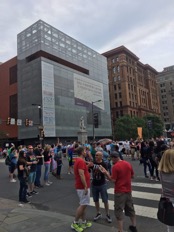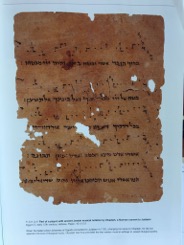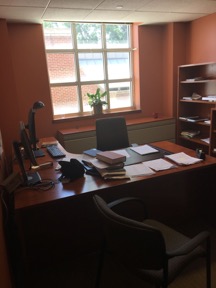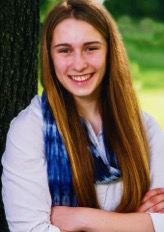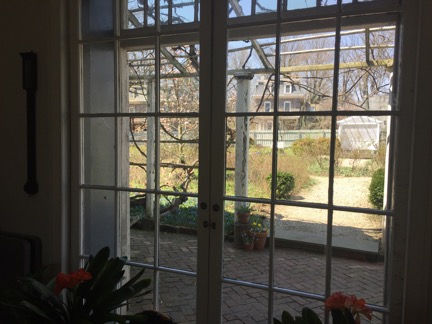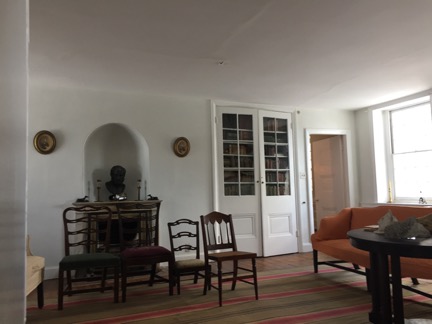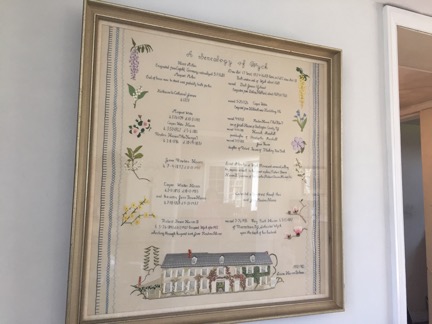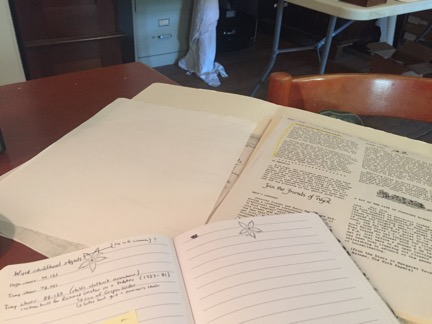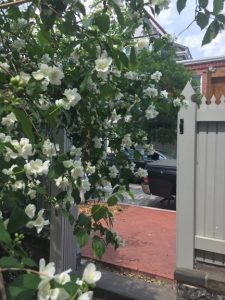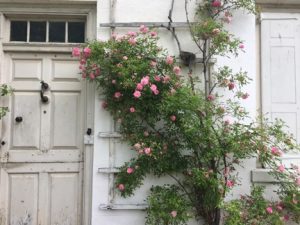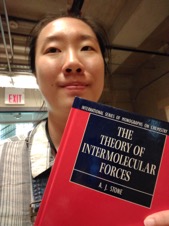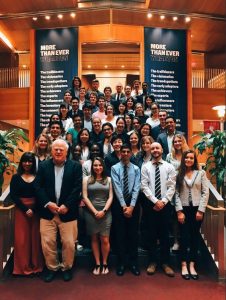Name: Hanna Meyer
Class Year: 2019
Major: Psychology and Linguistics
Hometown: Mill Valley, Calif.
Internship Placement: Caribbean Primate Research Center
Job Title: Intern
Location: Punta Santiago, Puerto Rico
What’s happening at your internship?
As I sit to write at my kitchen table I am consumed by the warm tropical air that flows freely though my apartment, carrying with it the distant sound of crashing waves. Just beyond these waves sits Cayo Santiago, La Isla de los Monos reminding me that my fourth week here has come to an end. I am nearly halfway through my internship with the Caribbean Primate Research Center, and thus nearly halfway through my days on “Cayo” (as the researchers refer to it), a small island off the southeastern coast of Puerto Rico inhabited by more than one thousand rhesus macaques. Their ancestors were brought here in the 1930s by researchers who, tired of chasing the monkeys across the jungles of south and southeast Asia, were looking for a more efficient way to study their behavior. Today, thanks to their efforts, the rhesus macaque is one of the most studied species of monkey. Tomorrow, I, as well as several other researchers and staff, will continue to take a small part in carrying through with their mission, as we make our way to the dock and into a small motorboat that will carry us back to the island, and back to the monkeys.
Each morning (Monday through Friday), a group of about 10 people depart for Cayo. Several of these people are boatmen who operate the motorboat and feed the monkeys, along with many other tasks serving to maintain the island and its inhabitants. Several more are staff of the CPRC, including a veterinarian and several census takers who keep track of the wellbeing of the population of monkeys. The rest of us are researchers, grad students or interns (like me), collecting data that, in the case of grad students will be used in their dissertations, and in the case of full-time researchers and interns (like myself), will be used in our supervising primatologist’s current study.
The way each researcher spends their time on Cayo is dependent on the demands of their current research, but in the big picture, the goals are fairly universal: watch monkeys and record their behavior. It’s harder than it sounds. Without considering the work that goes into removing bias and adhering to the scientific method, watching an individual monkey for 30 minutes to several hours at a time requires a tremendous amount of focus and energy. The monkeys move fast, can easily fit under branches and bushes that are impossible to penetrate if you’re above 2 feet tall, and can be very difficult to tell apart from their companions. Oh, and they aren’t afraid to bite a researcher (in fact, a few of them seem to enjoy it). However, that isn’t to say that the work isn’t incredibly rewarding. Five days a week I spend 7 hours on Cayo, following a minimum of 6 individuals for 30 minutes at a time, recording their behavior, location, clique size, and other measurements every 5 minutes. I have never before had the opportunity to work so closely with non-human primates, gotten to hike in the outdoors for work (hike being an elegant phrasing of “chasing monkeys around the jungle”), or been given so much independence in the workplace. Though it has been both frustrating and exhausting at times, and it has been quite a humbling experience to realize how easily I can be outsmarted by a monkey, it has been an amazing experience that has allowed me to immerse myself in a field I dreamt about as a child.
It’s not every day that your primatologist hero emails you back within a single hour, gives you career advice, and pushes you in the direction of an amazing opportunity to study monkeys on an island in Puerto Rico.
Why did you apply for this internship?
Though primatology was my dream profession as a child, somewhere between elementary school and college it was forgotten. It wasn’t until my junior year at Bryn Mawr that I realized my interest in linguistics and psychology both stem from my interest in primatology, but even more importantly I realized that primatology is something that I could seriously pursue. During my junior seminar, a requirement of my psychology major, I shared that I was interested in pursuing primatology, and my professor shared with me the names of two professors at the University of Pennsylvania whose work she suggested I explore. It turned out that the questions they were asking about primates were the same questions that have drawn me to primatology since a young age. I worked up the courage to email these primatologists asking if 1.) their lab was still operating, and 2.) could I please spend my summer working in it. Only one hour later I received a response telling me that unfortunately their lab was closed (as they had retired), but that I would get a much better sense for the field of primatology if I were to spend my time doing fieldwork rather than working in a lab. They proceeded to list a number of locations I may be able to find an internship collecting field data, included Lauren Brent’s work at Cayo Santiago. It’s not every day that your primatologist hero emails you back within a single hour, gives you career advice, and pushes you in the direction of an amazing opportunity to study monkeys on an island in Puerto Rico. After that, I sent a very enthusiastic email to Lauren Brent, and just a few months later, here I am.
What is something you have learned from your internship that you didn’t expect?
This internship, and every aspect of the tiny temporary life I have created here that came with it, has given me a small window into what post-college life may look like. Through this window I have been able to learn a lot about what it means to be an adult, and to be entirely independent and responsible for my own choices, as well as small things like what it means to live alone and to have to create my own after-work life. Since I’ve arrived here I have had to make some difficult choices, like choosing to change my living arrangements, but what I have essentially learned is simple: in both work and life you get out what you put in. One of the most unexpected results of this internship was the way I have been able to become involved with a small local animal rescue operation. It is tiny and disorganized and working its way towards someday (hopefully) stepping up to the status of a real nonprofit organization. However, what is incredible about its current disorganized state is that it is entirely up to every individual how much or little they contribute to this organization, and as a result, how much or little they are involved. In the truest sense, you get out of it what you put in. Being involved with this group has helped me understand the importance of diving in and pursuing a passion, as well as being selfless. Because of the time and energy I have put into this group, I have been blessed by some truly rewarding experiences, some of which coming in the form of friendships with incredible individuals who pour an enormous amount of their own time, energy, and money into both the animals and people of their community. These people are the true embodiment of “you get out what you put in”, and they put more into this community than I ever would have been able to imagine. Leaving this internship in just 6 weeks, I hope that this is something I will be able to take with me through my next year at Bryn Mawr and into my adult life.
Living in a new city? What has that experience been like for you?
When I first arrived in the small town of Punta Santiago, for about one week I experienced a significant amount of culture shock. Though Hurricane Maria hit Puerto Rico almost one year ago, Punta Santiago is still deep in the process of recovery. However, while the effects of the hurricane are apparent, Punta Santiago’s spirit is just beginning to bubble back to the surface. On the beach, coconuts buried by the storm are beginning to sprout new palms, and dense carpets of seaweed churned up by Maria are beginning to coat the shores, leaving the water clearer and more brilliantly blue. In town, buildings are beginning to find themselves returning to their formal, brightly colored glory. And of course, the Puerto Rican flag is beginning to find itself returning to walls, windows, and lamp posts. While resilience is being practiced every day here in Punta Santiago, Maria has presented researchers with a unique opportunity to study a very similar embodiment of resilience happening on Cayo Santiago. Though very few trees or structures were left standing after the hurricane, not a single monkey died during the storm. Several deaths occurred in the weeks following the storm, likely due to the stress of the traumatic experience, but it is shocking and fascinating that these groups of monkeys, despite their strict social hierarchies, did not lose a single individual as trees fell and debris were thrown around them. It is interesting to be able to live in a town in which the hurricane has disrupted and destroyed so much, and then be able to work and study how the same hurricane affected, and continues to affect, a population of non-human primates living just parallel to shore.

